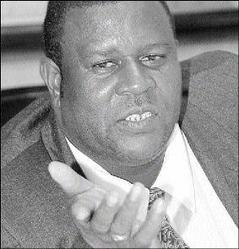Mark Titus, Enterprise Reporter

Douglas-Brown: No transportation policy is in place. - Photo by Mark Titus
The failure of the state to implement an uncompromising transportation policy has contributed to the traffic mayhem unfolding on Jamaica's streets.
Add that to unstructured urban planning, and commuters face a Pandora's box of woes.
This is the view of Jacqueline Douglas-Brown, programme director of the Urban and Regional Planning Programme at the Faculty of the Built Environment at the University of Technology, Jamaica.
"My feeling is that governments have successively not addressed this issue of how you move people from one town to the next, one city to the next, on a daily and weekly basis," she told The Gleaner recently.
"No transportation policy is in place, and they have not responded to the growth of our towns or cities adequately, and this has led to the existing disorder in the management of our traffic today."
Self sustainability
Douglas-Brown, who holds a master's degree in urban and regional planning, argues that Government must promote the concept of self-sustainable communities.
"Portmore exemplifies what has happened to too many of our towns throughout Jamaica - a lack of planning," she said. "Portmore is a dormitory town, but what if that should change and various activity systems were developed in the community? Then the need for that traffic coming into Kingston would reduce."
Portmore began as a large area for schematic residential development in the late 1960s, with West Indies Home Contractors building thousands of prototype housing units to alleviate overpopulation in Kingston. It has since grown as a parallel quasi-city to Kingston, as its large population travels into the capital daily, for work, school, and commerce.
"If we had a standardised system where schools, hospitals, churches, post offices and all the amenities for us to function were located in our communities ... then our traffic flow would be manageable," Douglas-Brown told The Gleaner.
Shared sentiment
Robert Montague, state minister with responsibility for local government reform in the Office of the Prime Minister, shares the sentiments of Douglas-Brown.
"In Jamaica, what you find is that all our towns, apart from downtown Kingston, were laid out without any planning, and that is why the new building code is important, so that when we are designing new towns, we have proper areas for road expansion, community space and properly zoned commercial areas," Montague explained at a recent Gleaner Editors' Forum. "That is what is affecting us now, Kingston was never designed for so many persons, so many vehicles."
According to Portmore Mayor Keith Hinds, the council is now exploring ways to respond to the rapid urban growth.
"The city is jumping out at its seams in people growth," he said. "What we are looking at is how we can impact on the city in terms of development, in terms of getting people to work in the city that they live in.
"What we are looking at right now is the hospital project, and we are waiting on a Cabinet decision on the acquisition of land to move into that project. That project is perhaps over $200 million, which would change the face of the particular area and bring in some business development in the city," the mayor said.
Carpooling
Douglas-Brown also believes that carpooling would cut the country's oil bill, which exceeded US$2b according to 2007 estimates, and eventually reduce traffic volume.
"There was a time when more persons took the bus, but today a lot more individuals are driving their own cars, because it is a part of the Jamaican culture that owning a car is an indication of prosperity, as well as the fact that people are not comfortable with public transportation," she said.
Douglas-Brown also believes Jamaica's urban traffic capacity is overstretched.
"I have not done any research to actually prove that, but history shows that our road network was not designed to take the volume of traffic that we are now putting on our roadways," she said.
mark.titus@gleanerjm.com

Hinds: Portmore is jumping out at the seems.

